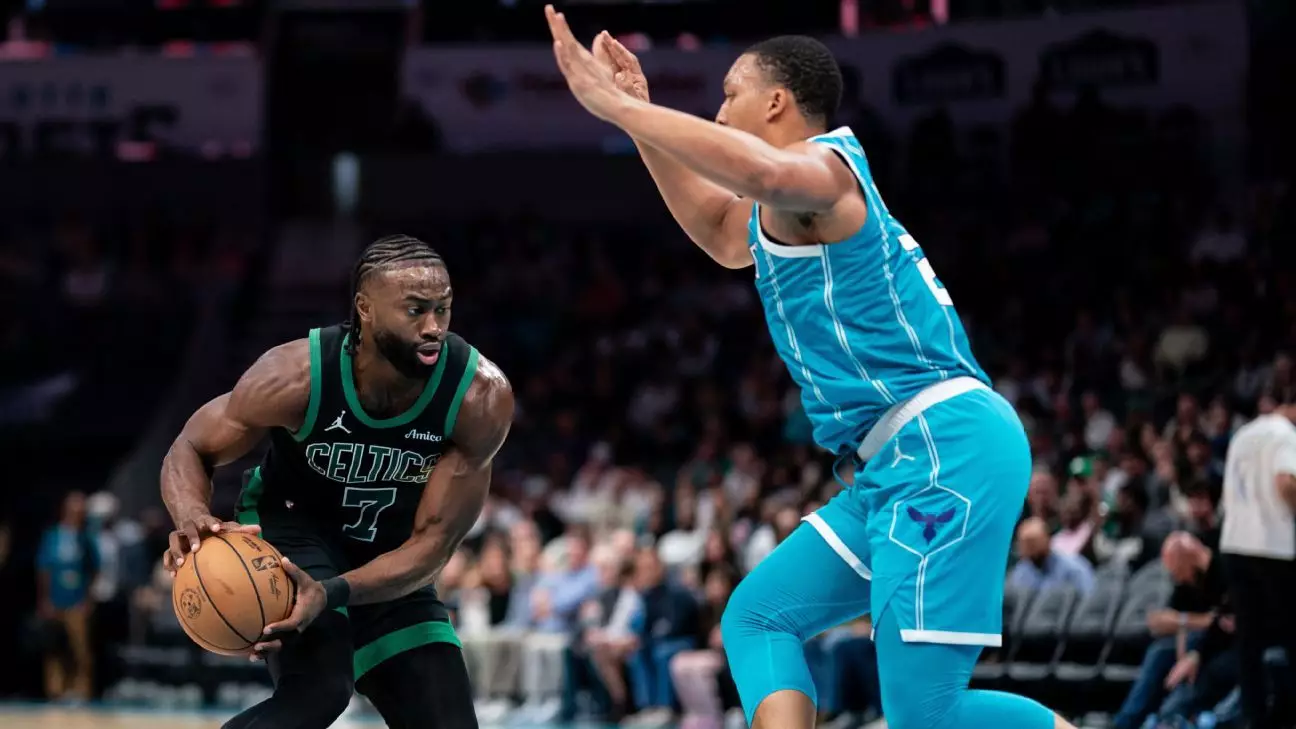In a high-stakes matchup, Jaylen Brown shone brightly as the Boston Celtics defeated the Charlotte Hornets 124-109. Contributing significantly to the team’s victory with 25 points, Brown showcased his scoring ability and defensive acumen. However, his standout moment occurred off the court, where he openly criticized former teammate Grant Williams for a contentious play that escalated tensions during the game. The incident brings attention to the precarious balance between sportsmanship and competitive drive in professional basketball.
The controversial event unfolded late in the fourth quarter when Williams made a jarring move against Jayson Tatum, hitting him as he dribbled near the half-court line. Tatum was knocked to the ground, a visual manifestation of the severity of the contact. As emotions surged, Brown confronted both Williams and the Hornets bench, voicing his displeasure. This confrontation not only illustrated the competitive spirit within the Celtics roster but also highlighted the intricate relationships among players who have previously shared a team dynamic.
In addressing the foul, Brown made his feelings unmistakably clear. He dismissed any notions that Williams’ actions were accidental. His comparison of the foul to a “football play” speaks volumes about the aggressive nature of certain basketball maneuvers that can easily be perceived as more than just part of the game. By asserting, “Grant knows better than that,” Brown suggested a breach of expected ethics among teammates, emphasizing a foundational principle of loyalty.
On the other hand, Williams offered a different narrative, expressing regret for the hard hit while maintaining that there was no malintent behind his actions. He characterized Tatum as a close friend, indicating a personal connection that complicates the situation. Williams’ assertion that the situation was escalated by Brown reveals the multifaceted nature of player interactions—friendships and rivalries intermingle beneath the competitive surface. His defense, “Not trying to hurt anybody,” signifies an understanding that while the game demands aggression, intention matters deeply in these moments of confrontation.
Despite the discord, Williams stood by the idea that basketball includes moments of physicality that don’t necessarily imply ill will. In a league that often blurs the lines between competition and camaraderie, determining a clear-cut intent behind such hard fouls becomes a complex challenge.
Head Coach Joe Mazzulla’s comments following the incident provided yet another layer of analysis. By expressing relief over Tatum’s ability to quickly recover, Mazzulla pointed towards the resilience expected of players in high-pressure situations. His remarks suggest an endorsement for a mentality focused on the game, rather than becoming sidetracked by outside conflicts. This speaks to a coaching philosophy that values performance and emotional stability over reactive behavior.
As the game progressed, tensions remained palpable. LaMelo Ball was also assessed a flagrant foul against Tatum, indicating an escalating level of aggression from both teams. The ejection of Hornets forward Miles Bridges further illustrated the game’s underlying animosity, hinting at an increasingly hostile competitive atmosphere. Brown’s remarks about opponents attempting to “send messages” highlight a common strategy in professional sports to unsettle opponents, yet emphasize the Celtics’ resolve not to become distracted or rattled.
The Celtics and Hornets are set to face off again soon, giving both teams an opportunity to revisit the sore spot left by this game. The quick turnaround not only allows for a test of resilience but also a chance for potential redemption or further escalation. Such dynamics shed light on the inherent drama within sports, where each matchup becomes a narrative woven with history, personal relationships, and competitive spirit.
The clash between the Celtics and Hornets encapsulated the essence of professional basketball—the blend of skill, rivalry, and interpersonal relationships. As Brown and Williams find themselves on opposite sides of a contentious moment, the specter of this incident will likely linger, influencing future interactions on and off the court. The forthcoming clash in Boston promises to be more than just another game—it will be a stage for resolving conflicts, reinforcing alliances, and redefining friendships in the ever-volatile arena of professional sports.

Leave a Reply